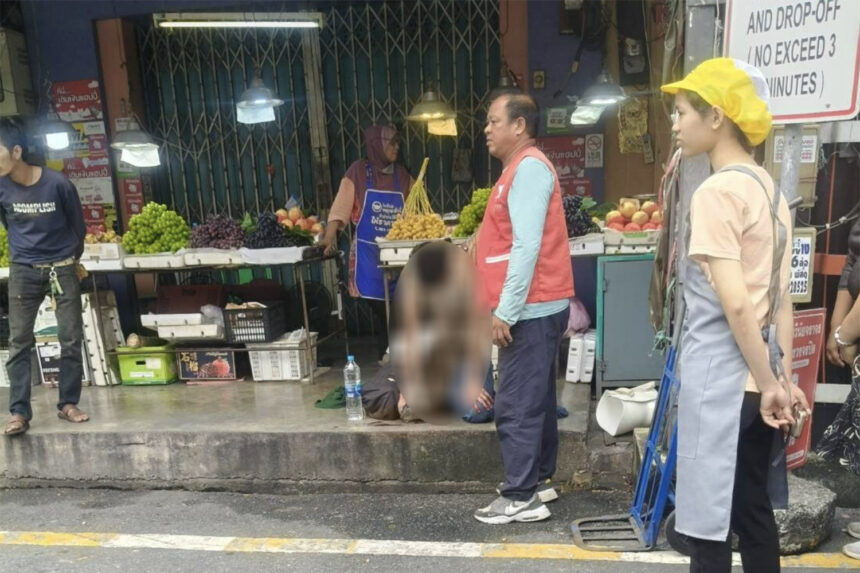SONGKHLA – On Thursday evening, a French tourist was hospitalized after he stabbed himself three times inside a chicken rice shop in Hat Yai district. Eyewitnesses said the man hurt himself in front of Kim Yong Market, a well-known spot in the city.
According to those on the scene, he picked up a pair of scissors from inside the chicken rice shop and used them to stab his own abdomen.
Rescue teams arrived quickly and found a 25-year-old, identified only as Anu. Officials kept his surname private. He had three large wounds on his stomach. Medics gave him first aid before taking him to the hospital for further treatment.
People nearby said they saw the man walking by himself in the area. Moments before the incident, he ran inside the restaurant and harmed himself. Witnesses appeared shaken by what they saw.
Police are waiting until he is well enough to speak with them. Early information suggests he may have acted due to influences from a group or faith he follows, but details remain unconfirmed.
French Tourists in Thailand
Thailand attracts around 750,000 French visitors each year, thanks to its unique charm and affordable lifestyle. Many are drawn in by the warm weather, vibrant markets, and sandy beaches. Still, cultural differences sometimes cause problems.
Thai society places great importance on respect and polite behaviour, which can be missed by visitors who are not aware of these values.
French tourists, like many others, sometimes get called out for not following local customs. For example, some people wear shorts or sleeveless tops at temples, which goes against dress codes that ask for covered shoulders and knees. Others are seen acting as if rules do not apply to them in busy tourist spots such as Phuket or Pattaya.
There have also been incidents outside Thailand that reflect similar misunderstandings. In 2015, police detained three French tourists in Cambodia for taking nude photos at the Banteay Kdei temple within the Angkor site, recognized as a UNESCO World Heritage location. Local authorities considered this behaviour disrespectful to a sacred place and sent the tourists back home.
While these incidents don’t represent all French tourists, they highlight the importance of cultural awareness. Visitors are advised to respect local customs, such as dressing modestly at religious sites and avoiding disruptive behaviour, to maintain positive relations with locals.
Mental Health Support for Tourists in Thailand
Travelling through Thailand’s lively cities and beautiful scenery brings excitement, but it can also lead to mental health struggles for some visitors. Sudden cultural differences, language gaps, or travel problems can add to stress, anxiety, or feelings of isolation. Busy hotspots like Bangkok or quiet rural regions can make these feelings stronger.
Pay attention to signs such as low mood, panic, or feeling lost, as these should not be ignored. Simple steps help, such as sticking to regular habits, staying hydrated, and finding calm places to unwind. Keeping in touch with friends or family through video calls can help you feel more connected.
Thailand does have mental health support, although options might be limited in the countryside. In Bangkok, hospitals like Bumrungrad International and Samitivej Sukhumvit have English-speaking therapists and counsellors. The 1323 hotline, run by Thailand’s Department of Mental Health, operates all day and offers free guidance in Thai and some English. You can also contact your country’s embassy for help finding support.
Check your travel insurance, as many plans include cover for mental health issues. Online therapy services such as BetterHelp or Talkspace can be a good solution while abroad. Joining traveller or expat groups on sites like X (formerly Twitter) gives you community support and tips from others with similar experiences.
Before your trip, research local health services, save emergency numbers, and share your plans with people you trust. With some planning, travellers can manage mental health challenges and still enjoy everything Thailand offers.














